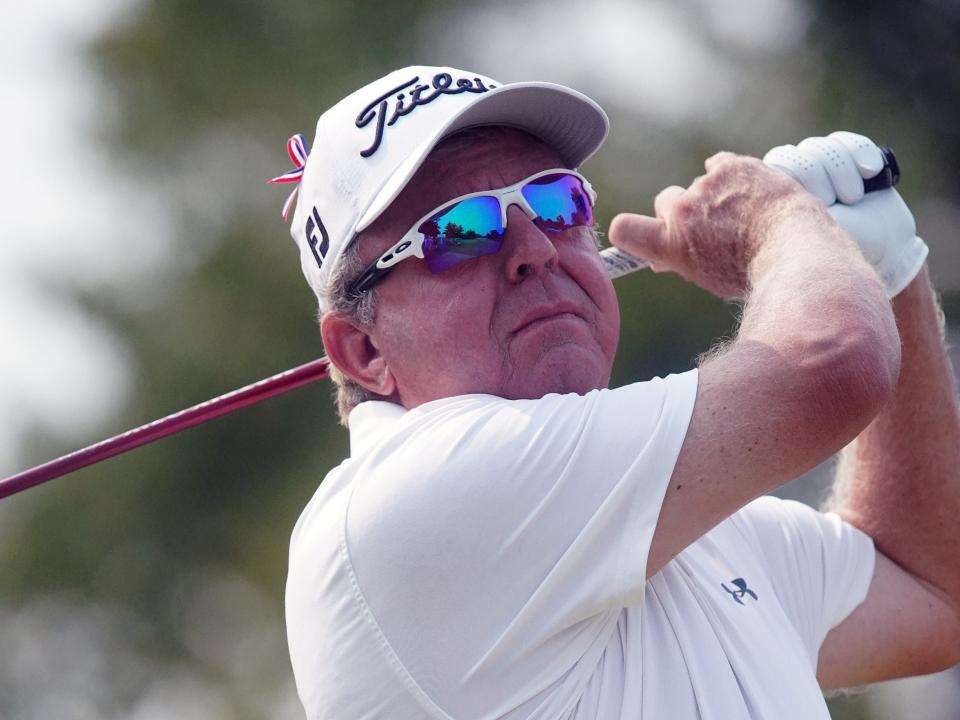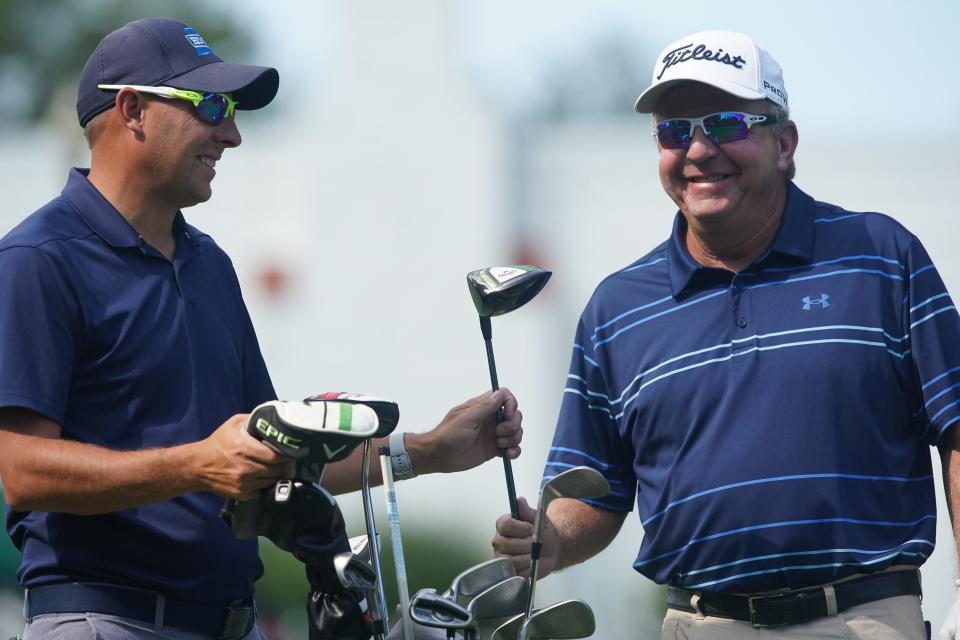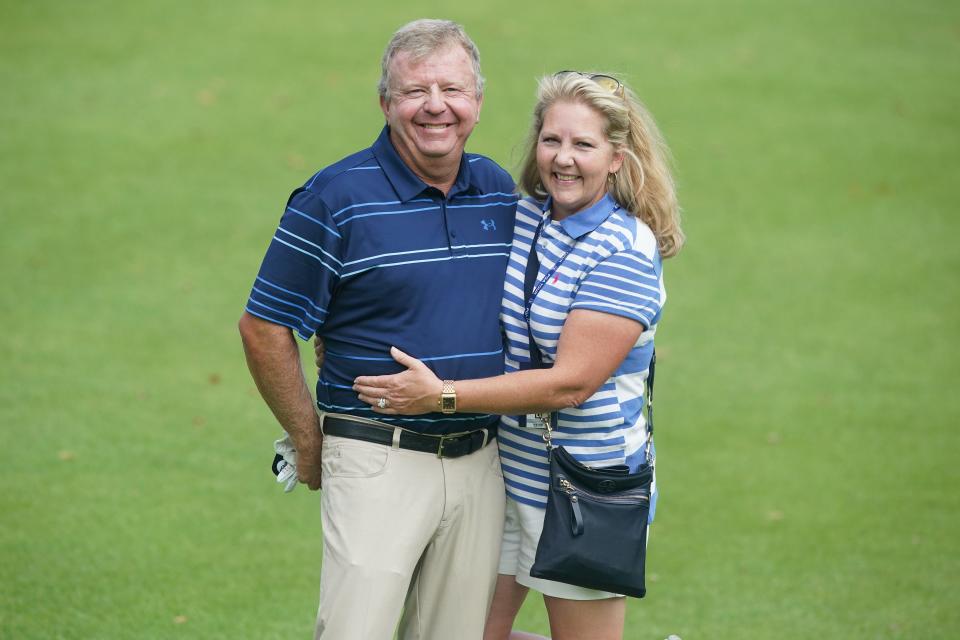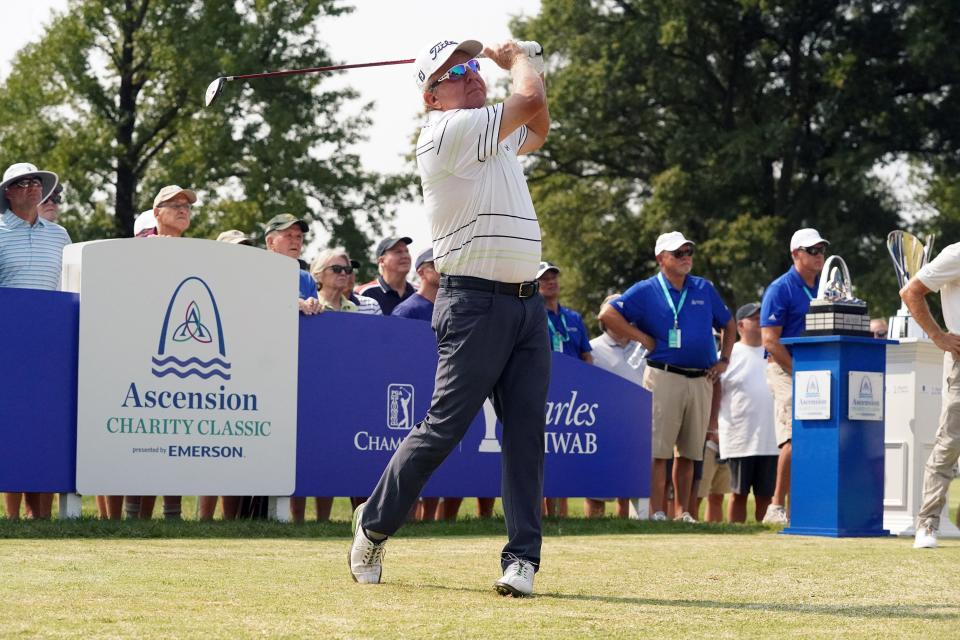On a sunny Tuesday ahead of the Principal Charity Classic, Billy Mayfair finishes up his practice round at the Wakonda Club in Des Moines.
His service dog, Boomer, pants in the shade of the empty gallery overlooking the 18th hole. Mayfair sinks a few putts and his wife, Tami, tosses golf balls on different areas of the green, testing for slope or rough patches that might affect her husband’s game come competition time.
Mayfair is a 35-year veteran of the sport, beginning his professional career in 1988. But on this Tuesday, he looks like any golfer squeezing in a round before a PGA Tour Champions event comes to town.
Upon first glance, the average eye wouldn’t recognize Mayfair as the only player to beat Tiger Woods in a playoff on the PGA Tour.

“To still be asked, even after 25 years, it’s an honor,” Mayfair told the Des Moines Register. “It really is. Tiger is, if not the best player, one of the best players in the world. It was more gratifying to me because it was in (Los Angeles), on a home golf course that he’d grown up on.
“I think everyone just kind of expected him to win. But I was playing well that week. Tiger made a comment to me once, that I’m the only one he can’t intimidate. So, that was a really nice gesture on his part.”
Both Woods and Mayfair shot 12-under-par, but it was the latter who won out in the playoff of the 1998 Nissan Open.
Twenty-five years down the road, it’s still one of Mayfair’s top memories in the game – not so much because of the win, but because of the camaraderie between him and his competition. That’s part of what has kept Mayfair in the game for so long.
But he also likes the isolation that comes with being out on the course for hours on end.
It wasn’t until recently that Mayfair realized why he enjoyed the time to himself so much.
Mayfair’s lifelong love of golf finally made sense
Mayfair’s father was a “pretty good” amateur player, but Mayfair himself started out as a swimmer. He juggled both sports recreationally for a while before deciding to narrow it down to one.
“When I first started, I was a really good swimmer,” Mayfair said. “But for swimming, we got ribbons. For golf, we got trophies. That made my decision really easy.”
The 56-year-old Arizona native stuck with the right sport.
Mayfair has five PGA Tour wins under his belt, as well as 73 top-10 finishes, 38 top-five finishes, five third-place finishes and 15 runner-up finishes for over $20 million in career winnings on that tour alone.
He had a knack for the game and loved the competitive side of golf. Mayfair also enjoyed the solitude that came with playing a solo sport.
But he didn’t understand why until over three decades after he began his professional career.

In 2019, Mayfair was diagnosed as having autism spectrum disorder. He went public with his diagnosis in 2021.
“Now that I have my autism diagnosis, I understand why I’d love going out to the golf course and being by myself and playing,” Mayfair said. “Just being out there by myself, I never could figure out why I loved doing that so much.”
Struggling to even get tested for autism as an adult
When it comes to his autism diagnosis, Mayfair speaks with ease.
But that wasn’t always the case.
It was Mayfair’s wife, Tami, who first pushed him to explore the possibility that he may have autism or another diagnosis. He admits that he fought against her wanting him to seek help from a doctor, but she wasn’t going to give up that easily.
She took full advantage of Mayfair’s career, or more so how it allows the couple to travel to all parts of the globe.
“I asked myself, ‘What do I have at my advantage?'” Tami said. “Well, we travel. I started interviewing doctors everywhere we went. I mean, I interviewed somebody in Japan and somebody in England when we were there.”
As luck would have it, though, the doctor that impressed Tami the most was in their own backyard.
The Mayfairs found a doctor willing to seriously test Billy – then 53 years old – for autism spectrum disorder. Once they got the official diagnosis is when the real work started.
Both Billy and Tami agreed that they had to relearn how to interact and communicate with each other; Tami likened it to learning another language. It was an adjustment for both parties, as Billy began to understand why or how he felt certain ways and Tami looked for support as the loved one of a person with autism.

With time came acceptance, and the Mayfairs adapted to a new normal.
That doesn’t mean, however, that there aren’t day-to-day struggles.
Through it all though, golf has provided an outlet for both Billy and Tami, and that’s just part of the reason why Mayfair continues to play at a professional level.
With acceptance came a new purpose
At 56 years old, Mayfair could probably retire if he wanted to. And he’s been through so much – an autism diagnosis and a battle with testicular cancer in 2006 – that no one would blame him for stepping away from the professional side of golf.
But the competition and the camaraderie keep him in the game.
“I enjoy the preparation,” Mayfair said. “I enjoy the competition. I enjoy Friday morning, when we all start dead even and, no matter what you did last week or two weeks ago, it doesn’t matter.”
That is an answer many professional golfers might give when asked about retiring, especially when they’re still physically able to play the sport.
It’s also an answer more aligned with the neurotypical brain.
“From my point of view, what else is he going to do?” Tami said. “With autism, they have to know the ‘how.’ His entire life, all he has been taught is golf. People ask him this question all the time, that he could hang it up and do something else. That’s for the neurotypical brain. For the autistic brain, they don’t know how. He knows this one thing, and that’s his path.”
So, Mayfair will continue to play, because not only is golf his career, but it’s also what makes sense and brings him peace.
His diagnosis has also given him a platform to show other people that autism is not a deterrent. In fact, autism makes him unique and allows him to approach things differently than neurotypical individuals would.

“Some of the talent that’s out there, and I’m not just talking about athletic talent,” Mayfair said. “(People with autism) become so specialized in something that they do. Lawyers, accountants, where they do the same thing over and over and do it so well.
“That’s us, and that’s OK. That’s great. We’re not alone, and that’s why I really wanted to come out, to show that.”
Mayfair did not immediately go public with his diagnosis. He said that, in a way, the pandemic was a blessing, because it gave him time at home to work with his doctors and better understand how autism impacted him.
He didn’t want to speak about something that he didn’t understand himself. But now that he has, Mayfair looks forward to tour events, when he gets to meet fans who he’s impacted not just because of his golf career but also because they can relate to him on another level.
“There probably isn’t a tournament that goes by that someone comes and says, ‘You helped my son, my son wouldn’t get diagnosed.’ But when you have people who are in their 40s, 50s, 60s getting diagnosed and coming back and saying thank you, that’s really gratifying.”
Alyssa Hertel is the college sports recruiting reporter for the Des Moines Register. Contact Alyssa at [email protected] or on Twitter @AlyssaHertel.
This article originally appeared on the Des Moines Register: Billy Mayfair discusses beating Tiger Woods, autism diagnosis